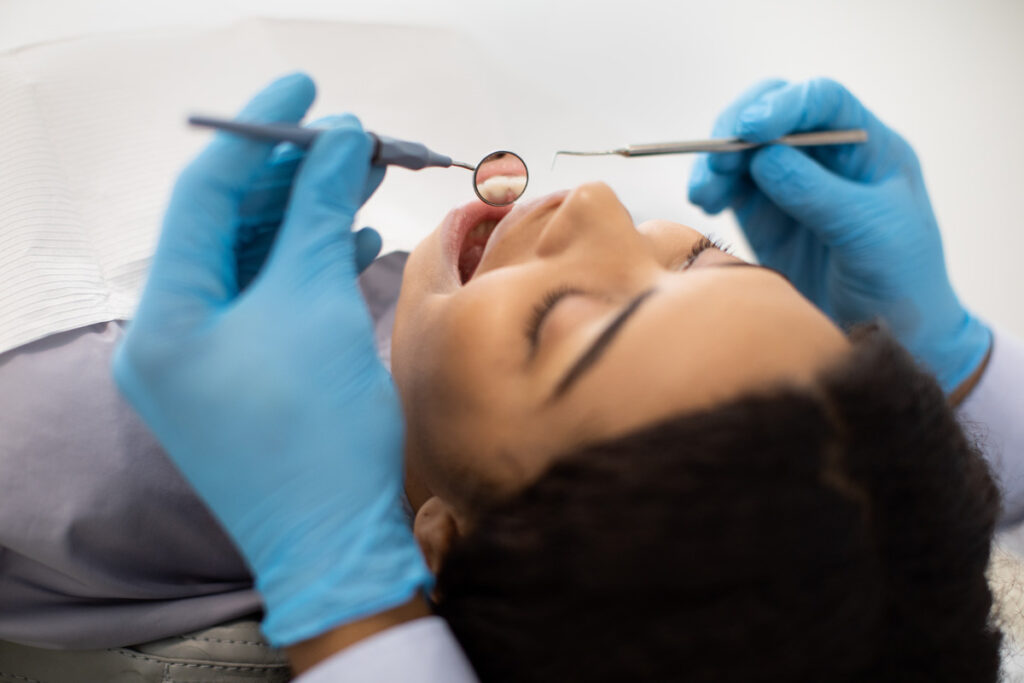Are you curious about how often you should be calling your dentist for a cleaning? You’re not alone! Dental cleanings are essential, yet many of us aren’t sure how frequently we should be scheduling them. Fortunately, this guide is here to help you figure that out and make sure your pearly whites stay in tip-top shape.
The Power of Dental Cleanings
Let’s face it—we all want a killer smile and healthy teeth. Dental cleanings are your secret weapon to achieving just that. They’re not just about looking good; they’re your first line of defense against tooth decay, gum disease, and other pesky oral health issues.
The Process
- Initial Exam: The cleaning process starts with a thorough examination by the dentist or hygienist. They use a small mirror to check your teeth and gums for any signs of gingivitis or other potential concerns.
- Scaling: Next comes scaling, where special tools are used to remove plaque and tartar buildup from your teeth. This step is crucial, as tartar cannot be removed with regular brushing and flossing at home.
- Polishing: After scaling, your teeth are polished to remove any surface stains. A gritty toothpaste and a high-powered electric brush are used, ensuring a deep clean.
- Flossing: Professional flossing follows to clear any remaining plaque and toothpaste debris between your teeth.
- Fluoride Treatment (Optional): Many dentists offer a fluoride treatment to help strengthen your teeth and protect against cavities for several months.
The General Rule for Dental Cleanings
When it comes to dental cleanings, there’s a golden rule that most folks follow. The general recommendation is to book a cleaning every six months. This twice-a-year schedule is ideal for keeping your mouth healthy and your smile brilliant.
Why biannual cleanings, you ask? Well, they do wonders for plaque and tartar removal. No matter how diligent you are with brushing and flossing, some plaque manages to stick around. Regular cleanings ensure it doesn’t turn into tartar, which is way harder to remove. Plus, these appointments allow your dentist to spot any sneaky cavities early on, so you can nip them in the bud.
Factors That May Influence the Frequency of Dental Cleanings
Everyone’s mouth is unique, which means your dental cleaning schedule might differ from your neighbor’s. Several factors come into play when determining your ideal frequency.
- Oral Health History: If you’ve had past issues with gum disease or frequent cavities, your dentist may recommend more frequent cleanings to prevent recurring problems.
- Lifestyle Habits: Smokers and those who consume a lot of sugary or acidic foods and drinks might need to visit the dentist more often for cleanings. These habits can increase the risk of dental problems, requiring closer monitoring and maintenance.
- Age: Children and teenagers, whose teeth and gums are still developing, might require more frequent check-ups to ensure proper growth and address any issues early. Similarly, older adults might need more attention due to age-related changes in oral health.
Importance of Personalized Dental Care
Think of your dentist as your oral health coach. They’ll consider all the factors—your medical history, lifestyle choices, and current oral health status—to come up with the perfect cleaning schedule. This personalized approach ensures you receive the best care possible and maintain that bright, healthy smile.
Tips for Maintaining Oral Health Between Cleanings
Now that you know how often to schedule cleanings, let’s talk about keeping your teeth in top shape between visits. Maintaining good oral hygiene at home is just as important!
- Brush Twice Daily: Use a fluoride toothpaste and a soft-bristled toothbrush to brush your teeth at least twice a day. This helps remove food particles and plaque that contribute to tooth decay and gum disease.
- Floss Daily: Flossing removes plaque and food particles from between your teeth and under the gumline, areas your toothbrush can’t reach. Make it a part of your daily routine to protect your oral health.
- Use Mouthwash: An antimicrobial mouthwash can help reduce plaque and remove leftover food particles, giving your mouth a fresh, clean feel.
- Limit Sugary and Acidic Foods and Drinks: Sugary snacks and acidic beverages can lead to tooth decay and enamel erosion. Try to limit their consumption and rinse your mouth with water afterward.
- Stay Hydrated: Drinking water helps wash away food particles and keeps your mouth hydrated, which is essential for preventing dry mouth and maintaining saliva production.
- Regular Dental Check-Ups: Even between your semi-annual cleanings, don’t hesitate to visit your dentist if you notice any unusual changes like bleeding gums, persistent bad breath, or tooth pain. Early intervention can prevent minor issues from becoming major problems.
Smile Brighter with Manti Family Dental
Dental cleanings are a vital part of maintaining your oral health. The best dental care is the personalized plan, and at Manti Family Dental, that’s what we prioritize. With regular check-ups and tailored cleaning schedules, we’ll help you achieve a healthy, beautiful smile that lasts a lifetime. So why wait? Schedule your next cleaning now and keep on smiling.


